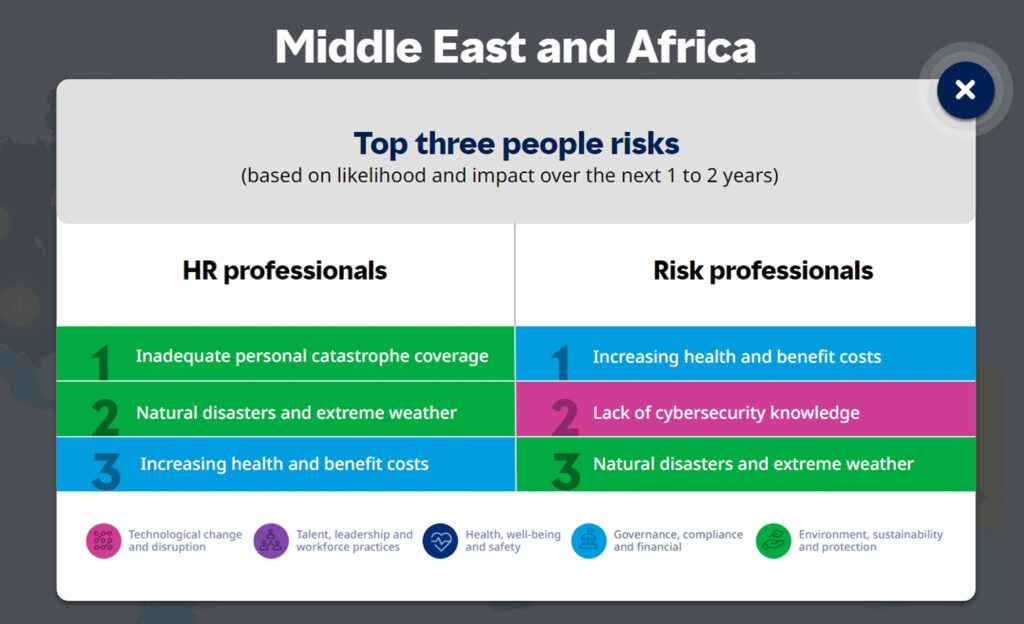
A new report from Mercer Marsh Benefits and Marsh McLennan reveals that organisations in both the United Arab Emirates and Saudi Arabia face various employee-related risks that could significantly impact their future success.
The “People Risk 2024” report, which surveyed 4,575 HR and risk professionals globally, including over 100 from each country, identifies key risks in five areas, these are technological disruption, workforce practices, health and safety, governance and compliance, and sustainability.
In the UAE, the primary concern is the mismanagement of AI, with 48% of respondents worried about over-reliance on AI without proper verification and 45% highlighting the misalignment between AI plans and the available budgets.
Other significant concerns include disparities in reward packages (47%), insufficient emotional well-being programs (42%), and inadequate health care benefits for climate-related conditions (48%).
Similarly, in Saudi Arabia, mismanagement of AI is a major concern, with 39% worried about over-reliance on AI and 35% about the erosion of human interaction.
Additional risks include natural disasters, inadequate personal catastrophe cover, suboptimal HR technology, and disparities in employee benefits.

Julio Garcia Villalon, Regional Leader for India, Middle East, and Africa at Mercer Marsh Benefits, emphasised that people risks are complex and interconnected with other organisational risks.
“While people can be an organisation’s most important strength, they can also expose organisations to risk without the right culture, policies, and training,” said Julio Garcia Villalon, Mercer Marsh Benefits’ India, Middle East, and Africa Regional Leader.
“People risks are broad-reaching, complex, and intricately linked to other risk challenges organisations face. Focusing on people in the context of each risk category can have a highly tangible impact on mitigating and reducing people risk in the future,” added Villalon.
The UAE’s organisations seemed to have a proactive approach, with 85% of respondents confident in their HR function’s risk management and 95% in the collaboration between HR and risk functions.
“Organisations in the UAE appear to be more vigilant about these issues than their global peers, which – if turned into action – could help to mitigate risks,” said Ayman El Hout, the UAE CEO of Marsh McLennan.
Within Saudi Arabia, there is a need for new approaches to managing people-related risks to support the Kingdom’s economic diversification. According to the survey, 75% of respondents in Saudi Arabia believe their HR function effectively manages workforce risks, and 99% acknowledge collaboration between HR and risk functions.
“Organisations in the Kingdom of Saudi Arabia recognise they have a role to play in the comprehensive strategic framework to reduce the Kingdom’s dependence on oil, diversify its economy, and develop a wider range of services for the community,” said Bassam Al Bader, CEO of Marsh McLennan, Saudi Arabia.
However, achieving those targets does require companies to develop new approaches to managing the people-related risks within their operations.
“The People Risk 2024 report demonstrates that employees are willing to deploy innovative technology and implement new approaches in support of the remarkable changes taking place in the Kingdom. However, it also suggests there is a clear need for greater support within organizations to enable them to do that effectively,” added Al Bader.
Both reports recommend that businesses collaborate internally to understand AI’s advantages and risks, evaluate uninsured scenarios, promote safe AI adoption, and develop a digital-first-person strategy to mitigate these risks effectively.